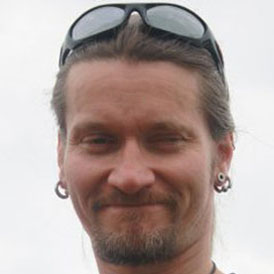Policing undercover policing: how far is too far?
As police watchdog HMIC reviews the use of undercover officers, Home Affairs Correspondent Simon Israel asks if we can trust them to robustly challenge how far operations go in the world of protest.
- Chapters
- descriptions off, selected
- subtitles off, selected
- captions settings, opens captions settings dialog
- captions off, selected
This is a modal window.
This is a modal window. This modal can be closed by pressing the Escape key or activating the close button.
Operations by undercover police should in future be approved in advance by high-level authorities outside the force, according to the findings of a review by the chief police watchdog.
The call for tighter controls follows the case of policeman Mark Kennedy who spent seven years living amongst environmental campaigners. He had relationships with two women he was sent to monitor, and fell in love with one of them.
Reacting to the findings, Mr Kennedy told Channel 4 News he had worked “extremely hard” for the police who had now made him a “scapegoat”.
Sir Denis O’Connor, the Chief Inspector of Constabulary (HMIC), said earlier that the report was about moving forward, about greater clarity of mission, greater oversight, and about assessing what constitutes serious disruption to the life of a community, writes Home Affairs Correspondent Simon Israel.
And with that the handful of undercover operations in the sometimes overlapping worlds of domestic extremism and protest movements will continue.
Last year the president of the Association of Chief Police Officers (Acpo) Sir Hugh Orde called for greater independent oversight. The organisers of that seminar, Liberty, wanted judges to have that role.
Sir Denis’s report makes clear the judiciary want nothing to do with it. I understand very senior judges feared it would undermine their independence.
Responsibility for oversight has returned to the very watchdog that failed to spot the rogue behaviour.
So responsibility for oversight has returned to the very watchdog that failed to spot the rogue behaviour of the very undercover officer Mark Kennedy which prompted the HMIC inquiry.
We learn from the report that unlike placing a bug in a car, the deployment of an undercover officer does not require prior approval by the Office of Surveillance Commissioners, and is only subject to review, astonishingly, through random sampling….in other words by chance.
Read more: 'Changing the rules of engagement' for undercover police
The report points out the Office of Surveillance Commissioners (OSC), headed by former Appeal Court judge Sir Christopher Rose, only twice reviewed Kennedy’s role during the seven years he was undercover and twice the OSC gave him the all clear.
- Chapters
- descriptions off, selected
- subtitles off, selected
- captions settings, opens captions settings dialog
- captions off, selected
This is a modal window.
This is a modal window. This modal can be closed by pressing the Escape key or activating the close button.
They ticked the technical box, the one about compliance with guidelines but they failed to probe the nature of the intrusion, the risks of becoming an agent provacateur, the value of the intelligence he was supplying, or the quaility of supervision.
So Sir Denis has recommended the OSC works harder and reviews undercover operations more often. But the only link the OSC has to the public is a report which comes out just once a year.
How can the public trust such a body to robustly challenge how far undercover operations should go in the world of protest?
Kennedy reaction
Mark Kennedy, the policeman whose actions led to this review, has rejected the claim he was “resistant to management intervention”. His actions led to the collapse of a court case against activists accused of planning to invade Ratcliffe-on-Soar power station near Nottingham.
It seems to be that when things were good everybody was happy, and now that I’ve been exposed, the opportunity to find a scapegoat has dropped at my door. Mark Kennedy
Kennedy went undercover to infiltrate left-wing protest groups using the persona “Mark Stone”. He travelled to 11 countries on 40 occasions.
The report said: “He seems to have believed he was best placed to make decisions about how his deployment and the operation should progress.”
Speaking to Channel 4 News, Mr Kennedy denied that he had “gone native”, insisting that despite having “some very good friendships [with the activists]” … “to the very last day I was providing intelligence to the NPOIU [National Public Order Intelligence Unit]”.
He accuses the authorities of making him a scapegoat: “I worked for seven years extremely hard – almost 24 hours a day – and while the intelligence was being supplied, there are reports in my personal file that say ‘Kennedy was providing the golden nuggets of intelligence’, ‘Kennedy was saving the taxpayer millions of pounds in proportionate policing’.
“It seems to be that when things were good everybody was happy, and now that I’ve been exposed, the opportunity to find a scapegoat has dropped at my door.”

Sir Denis O’Connor told Channel 4 News: “We think that over seven years, Kennedy tested the controls in the system in a variety of ways.
“He did produce some very useful intelligence which we detail in the report. But the controls and support… were inadequate to assist him.
“Any member of the public would understand that if you are working to somebody else’s persona for a number of years it is going to take an awful lot of personal discipline and control to stay on track and in touch with your mission all of the time.”